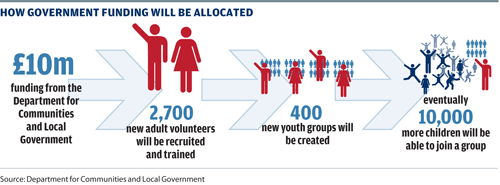Hunt begins for youth group volunteers
Neil Puffett
Monday, February 20, 2012
Government announces a 10m cash injection in a bid to attract 2,700 volunteers to work in new youth groups in deprived areas

Uniformed youth work received an unexpected and significant boost this month when Communities Secretary Eric Pickles announced £10m in funding to help attract and train 2,700 new volunteers to provide an additional 400 youth groups.
The money will be targeted at 11 deprived areas, where it is intended to have the biggest impact – including four London boroughs, Birmingham and Manchester.
Although the surprise announcement has been welcomed, it comes against a background of widespread cuts to non-uniformed youth work, and questions are already being asked about whether sufficient volunteers can be recruited in the earmarked areas.
The Scout Association alone has a waiting list of 30,000 young people, but has struggled in recent years to attract volunteers to deal with demand, so a recruitment drive must be on the cards.
However, details of how this will be achieved are thin on the ground. The funding will be distributed by Youth United, a coalition of volunteer-led youth organisations.
Youth professionals believe they should have been sounded out on what was necessary to boost volunteering prior to a package being put together.
"The announcement took us by surprise at a time we all know a lot of money is being pulled out of the sector," says Dan Sumner, senior policy officer at Volunteering England.
"Organisations would have expected there to be some consultation with the sector about how best that kind of money could be spent to have the most impact."
He says that new and imaginative ways of engaging urban volunteers must be found if the scheme is to be a success.
Research by Volunteering England in 2009 found an 80 per cent increase in those willing to volunteer, but later studies found this did not actually translate into more people giving their time.
"Either the reality of the kind of opportunities, or the perception of opportunities on offer are quite off-putting," explains Rob Jackson, who runs a volunteering consultancy firm.
"The fact that government has put in £10m is great, but if it is going to be spent by organisations doing what they have always done, then it is probably not going to be successful."
Instead, he says, a strategic approach to finding new ways of engaging potential volunteers and offering opportunities that fit in with modern lifestyles is essential.
This could mean requiring uniformed youth groups to change their expectations and be prepared to ask someone to volunteer to be involved with sessions over a six-month period rather than commit indefinitely, Jackson says. "Potential volunteers sometimes have the perception that an organisation wants them two mornings a week for the next 20 years," he adds.
"Quite often that perception is given out because that is the way they have always recruited volunteers. Volunteering has to fit around people’s lives."
The success of the recruitment initiative could also be jeopardised by an element of competition with other schemes looking to attract volunteers. For example, the Mayor of London Boris Johnson recently launched an almost identical scheme; a £1.3m programme called YOU (Youth Organisations Uniform) Matter.
This aims to recruit 1,000 adult volunteers and 8,000 young people to create 38 uniformed groups to open over the next three years, with two-thirds in areas of high deprivation. It is hoped these 8,000 young people will all be able to join groups by the end of 2014.
Meanwhile, the National Citizen Service, which is due to expand to offer 30,000 places this summer, is also in need of volunteers. Jackson fears this could lead to "duplication", with the risk that separate campaigns attempt to recruit the same people.
Beyond the logistics of recruiting the necessary volunteers, there will be a challenge to encourage young people in deprived urban areas to want to engage with uniformed youth groups.
This will rely on groups creating links with organisations already engaging with hard-to-reach children and offering flexible provision, tailored to the young people they are seeking to involve.
Relationships with local authorities and organisations such as the National Council for Voluntary Youth Services (NCVYS), which has both uniformed and non-uniform groups within its membership, will be important.
Susanne Rauprich, chief executive of NCVYS says: "As a network that prides itself on connecting the sector, sharing practice and brokering partnerships, we will do what we can to support organisations and volunteers wanting to work with young people through Youth United."





